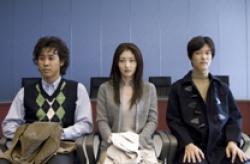After School

2007, 102 minutes
Review by Susan Meehan
For the fourth consecutive year, the Embassy of Japan organised a superb festival of new Japanese films at the very swanky and welcoming BAFTA premises over the weekend of 26-28 September 2008. Guided by the expert hands of Tony Rayns and Alexander Jacoby, the choice of new releases was extremely good.
The eagerly awaited “After School” (2008), Kenji Uchida’s first film in three years, reveals his talent as a screenwriter as well as director. Its UK premiere was held at BAFTA on Friday 26 September and was preceded by a friendly chat between Dr Rayna Denison, lecturer in film and television studies at the University of East Anglia, and Uchida, who had flown over from Japan especially for the event. This was Uchida’s first visit to the UK.
Uchida, it turns out, is a great fan of the Beatles and of Charlie Chaplin. He particularly admires the way Chaplin made films for people to enjoy. Making fun, enjoyable films is central to Uchida’s filmmaking and in fact his second feature, “Unmei Ja Nai Hito” or “A Stranger of Mine,” which picked up four prizes at the 2005 Cannes Festival, is sometimes described as entertainment not art.
Uchida wasn’t prepared to disclose much before the screening of “After School,” limiting himself to warning the audience that the mind-bending film might lose them at times and suggesting that it is probably better viewed a second time.
The film starts off by introducing us to Kimura (Masato Sakai) and Miki (Takako Tokiwa), childhood sweethearts, and their good friend and neighbour, Jinno(Yo Oizumi), a former classmate and now a teacher at their alma mater. While Kimura is the quintessential well-groomed salaryman of few words, Miki is the attractive doting wife and Jinno, an engaging tracksuit-clad teacher. Borrowing Jinno’s car to drive to work, Kimura asks the instantly likeable Jinno to keep an eye on the heavily pregnant Miki.
Things start to unravel when Kimura fails to return home. One of his superiors at work, in possession of an incriminating photograph of Kimura with a pretty girl, hires Kitazawa, a morose and seedy detective, to find him. Hoping to find clues at Kimura’s old school Kitazawa visits Nishi Morisawa High School claiming to be Kimura’s classmate. Before long, the affable and curly-haired Jinno becomes embroiled in Kitazawa’s hunt for Kimura.
Kitazawa begins to suspect that Kimura is involved with the yakuza and a bar hostess by the name of Ayumi, but Jinno resolutely remains loyal to his childhood friend, refusing to believe that he is guilty of any duplicity.The complex caper continues to absorb and puzzle the audience until all is revealed and the loose ends tied up.
The audience was then privileged to a Q&A session with Kenji Uchida and Rayna Denison, who expertly enticed Uchida to comment on the central concepts and premises of his film.
‘Information’ is central to Uchida’s films, topical in an age when most of us are suffering from a surfeit of it. Uchida is evidently bothered by the fact that people have their prejudices and tend to jump to conclusions and pigeonhole individuals with the limited information they may have about them. “After School” masterfully illustrates how we fall into this trap. All that needs to be said is that nothing is what it first appears to be.
Romance is also key to Uchida’s films. In fact, he always feels that he is working on a love story, though he expresses it within a complicated plot.
Denison remarked on the lack of nostalgia and glamourisation of Japan in his films to which Uchida responded by saying that having lived abroad for four years (he studied at film school in San Francisco), he began to see Japan with foreign eyes and wanted to show Japan and Tokyo as they are, the reality being that Tokyo is rather dirty.
Noticeably reluctant at having to conclude her interview with Uchida, Denison threw questions open to the audience and I asked about his interest in Charlie Chaplin. Uchida said that he had seen each one of Chaplin’s films, apart from his short films, ten times over and that his favourite film is “The Kid.” So genuine is his enthusiasm for Chaplin, in fact, that he was delighted to recount that he had once dated someone who shares Chaplin’s birthday.
I was very lucky to have had a couple of minutes with Uchida at the end of the Q&A. I began by asking what sort of student he’d been. He said that he had enjoyed school, been a good student and had particularly liked football; in fact he appears to be an avid football fan as he admitted that he would spend the main part of his last three days in London watching Premier League games. I couldn’t draw him into naming his favourite team. Next, I commented on the quality of the cast in “After School” and wondered whether he would use them in another film. Uchida didn’t rule this out, but said he had no such plans and would hold auditions for his next film, as normal. Before he rushed off to his waiting car, I managed to encourage him to visit Kennington and East Street Market, Charlie Chaplin’s old haunts.
My only regret – that I didn’t get to see the film twice over the weekend.

